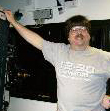|
|
 
|
|
Author
|
Topic: Digital Cinema in Brazil
|
Mike Williams
Master Film Handler
Posts: 255
From: Knoxville, TN
Registered: Feb 2002
|
 posted 02-17-2004 05:46 AM
posted 02-17-2004 05:46 AM




This was on slashdot this morning...
Link to the Article
from the February 05, 2004 edition - http://www.csmonitor.com/2004/0205/p07s01-woam.html
Brazil takes lead role in move to all-digital cinema
Using the latest technology, Brazil plans to open in May the largest network of digital movie theaters in the world.
By Andrew Downie | Correspondent of The Christian Science Monitor
RIO DE JANEIRO - The movie buffs that watched the Brazilian film "Os Normais" ("The Normal Ones") in a São Paulo cinema last October were not aware they were watching history being made. To the men and women sipping soft drinks and munching popcorn, the film - a spin-off from a popular Brazilian sitcom - did not seem that different from any other.
It was, however, a watershed that promises to have widespread repercussions, not just in Brazil but around the world. That's because there was no celluloid involved nor a reel-to-reel projector at the back of the theater. Everything about the film - from the production to the distribution to the exhibition - was done digitally. Brazil had never before dipped into digital, but it has emerged on top of the digital wave, debuting technology with "Os Normais" that is more sophisticated than most cinemas have seen.
"It was an important event because it showed that our industry can do everything on digital, and quality will not be compromised," said Fabio Lima, chief operating officer of Rain Networks, the São Paulo company that developed the new digital software. "The public liked what they saw on the screen [and] the industry was comfortable with the knowledge that we had found solutions for piracy [and] distribution. It was a landmark for Brazilian cinema."
Hollywood has made halting forays into digital cinema - George Lucas says that he will show the next Star Wars installment, due out next year, in theaters only with digital capability. But the cost of converting theaters to digital and concerns over piracy has the US movie industry moving in slow motion.
In Brazil, however, necessity has become the mother of invention. The hinterlands of South America's largest country are virtually inaccessible by roads, and copying and transporting hundreds of reels of film is expensive. Now Rain has developed a low-cost distribution system, with built-in antipiracy measures, and Brazil is poised to take the boldest steps yet into all-digital cinema, with 100 theaters - the largest digital network in the world - scheduled to be projecting pixels by May.
A nation steeped in technology
That such technological advances should come to Brazil, a country better known for the more frivolous pastimes of sunbathing, dancing, and soccer, may be surprising only to those unaware of Brazilians' love of technology. Although it is considered a developing nation, Brazil's long-standing tradition of openness, coupled with its sheer size, means that there are tens of millions of well-educated techies eager for cutting-edge gadgets and devices.
Brazil has one of the highest rates of Internet use in the developing world, with 95 percent of taxpayers using the web to make their annual income-tax declaration. The country's voting system is fully electronic and its banking software is among the most advanced in the world. Even Brazil's computer hackers are so skilled that a leading expert recently warned, "Brazil is both a laboratory for cybercrime and also its largest exporter worldwide."
But it's also home to the creative spark that was harnessed for more practical ends by Rain when they sought to develop a new digital exhibition and distribution platform. Using Windows Media 9 soft- ware, engineers came up with MPEG-4, video compression software that is cheaper and faster than the current system. The MPEG-4 software can squeeze a feature film onto a file of just five gigabytes, 15 times smaller than the MPEG-2 technology presently used.
The films are then beamed by satellite from Rain's central computer in Sao Paulo to picture houses across the country. Depending on bandwidth, it can take as little as 20 minutes to send a 90-minute film to a theater.
By eliminating celluloid and transport costs, distributors can quickly and cheaply beam blockbusters to distant towns the same day as they première in London, Los Angeles, or Sao Paulo. They can offer a wider range of films and even live broadcasts.
If films flunk at the box office, distributors can withdraw them immediately without having to rue the $750,000 it costs to make 500 copies of a big film like the Matrix or The Lord of the Rings. Such expenditures, combined with the prohibitive cost of transporting celluloid thousands of miles, explain why Brazil has one of the lowest density of screens per person in the world, an average of one screen per 105,000 people, far fewer than in the United States (one per 9,000), or even Mexico (one per 35,000).
It also explains why local distributors are keen to adopt the new technology. Valmir Fernandes, the director and president of Cinemark Brasil, a US chain that has 272 screens here, called the MPEG-4 system "the new technological reality."
These advancements coincide with a banner year for domestic films after last year's "City of God" made a big splash.
Fernandes warned it will take time for the system to take hold. Distributors, cinema owners, and studios all want one another to foot the bill for new digital cinemas. And until filmmakers start making movies exclusively on digital, there will not be enough such films to justify scrapping the current technology. Furthermore, because the MPEG-4 software is easier to manipulate, the new system has generated fears of piracy.
The first beneficiaries will probably be the independent distributors and low- budget filmmakers unable to afford the $50,000 it costs to make a celluloid master copy - and whose films are less likely to be victims of piracy.
An 'irreversible trend'?
Fernandes works with both the majors and the independents and said that no matter what happens, the Rain technology is here to stay. Hollywood may resist because of fears over piracy and losing control, but cinema cannot halt progress, he says. Through deals with US and British partners, Rain hopes to take its system global.
"We are here because this is an irreversible trend," he said. "You have a technology that is reliable and better than what went before. [If the future] is not with this Rain Networks format, it will be based on this format. It's just a question of time."
| IP: Logged
|
|
|
|
|
|
|
|
|
|
All times are Central (GMT -6:00)
|
|
Powered by Infopop Corporation
UBB.classicTM
6.3.1.2
The Film-Tech Forums are designed for various members related to the cinema industry to express their opinions, viewpoints and testimonials on various products, services and events based upon speculation, personal knowledge and factual information through use, therefore all views represented here allow no liability upon the publishers of this web site and the owners of said views assume no liability for any ill will resulting from these postings. The posts made here are for educational as well as entertainment purposes and as such anyone viewing this portion of the website must accept these views as statements of the author of that opinion
and agrees to release the authors from any and all liability.
|

 Home
Home
 Products
Products
 Store
Store
 Forum
Forum
 Warehouse
Warehouse
 Contact Us
Contact Us




 Printer-friendly view of this topic
Printer-friendly view of this topic







![[Mad]](mad.gif)




